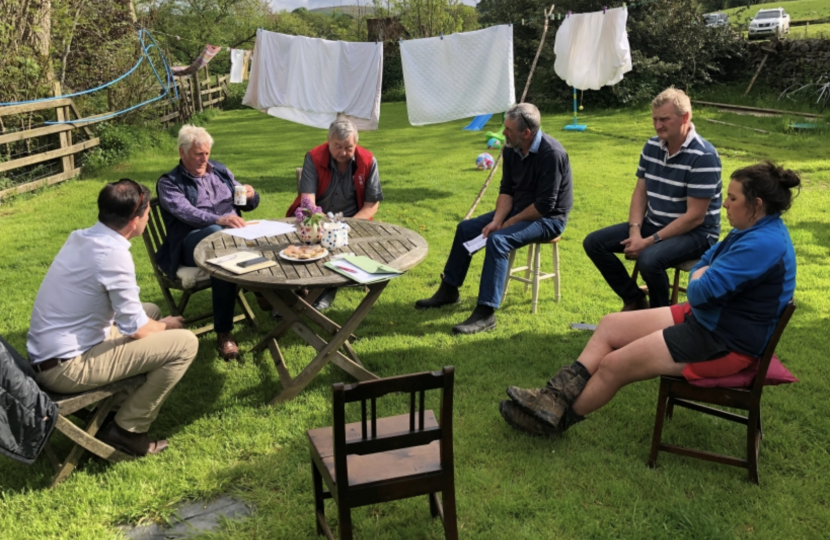
Robin sits on the Welsh Affairs Committee. The Welsh Affairs Committee is responsible for scrutinising the expenditure, administration and policies of the Wales Offices and the policies of the UK Government as a whole, that have an impact in Wales.
It is chaired by Stephen Crabb MP.
Robin is particularly pleased that the Welsh Affairs Committee are going to examine the impact of major policy changes on family farms. The majority of our farms in Aberconwy are family run so Robin is particularly keen for everyone involved in the rural economy in Aberconwy to submit evident to this committee. Having visited many of these farms over the last year Robin has listened to their concerns and been sure to make sure that their view have been shared at Westminster. So now, here is the opportunity for you to directly talk to government.
To find out more and join in the discussion please look at the link below or email [email protected], or call 01492 583094
New inquiry: The economic and cultural impacts of trade and environmental policy on family farms in Wales
Impacts of trade and environmental policy on family farms in Wales to be explored by MPs
The Welsh Affairs Committee has today launched a short inquiry which seeks to explore how major policy changes could affect family farms in Wales.
The policy changes being considered include – but are not limited to – UK Government policy on international trade and free trade agreements, and legislation around climate change. The Committee will explore how these policy areas are likely to impact societal connections and traditions in farming communities, and look at what can be done to support communities, their culture and heritage.
As part of this short inquiry, the Committee is focusing on ‘family farms’ (small and medium sized farms, for example hill farmers) rather than large, industrial size farms.
Rt Hon Stephen Crabb MP, Chair of the Welsh Affairs Committee, said:
“International trade agreements and an ever-ambitious environment agenda have dominated much of UK Government policy over the last few months and years. However, it is crucial that we understand the impact they are having on ordinary people and communities who are just trying to make a living. We must make sure everyone benefits from these policy advances, and by looking at the impact on family farms, we hope to shine a light on how communities can prosper for generations and how their livelihoods can be safeguarded.”
Terms of reference
The Committee on this link is inviting written evidence responding to the following questions. The deadline for submissions is Friday 24 September.
· How unique are family farms and how significant is their contribution to Wales’ cultural life?
· What are the main challenges facing family farms specifically, and farming communities more generally, in Wales?
· What are the potential implications of free trade agreements for farmers in Wales?
· How, if at all, is the UK Government’s climate change policy agenda impacting on family farms, including the future generations of farmers, and rural communities in Wales?
· What practical steps can the UK Government take to support these communities and how should the UK and Welsh governments work together to support these communities unique culture, including their contribution to the Welsh language, and heritage?
Ymchwiliad newydd: Effeithiau economaidd a diwylliannol polisi masnach ac amgylcheddol ar ffermydd teuluol yng Nghymru
Asau i edrych ar effaith polisi masnach ac amgylcheddol ar ffermydd teuluol yng Nghymru
Mae’r Pwyllgor Materion Cymreig wedi lansio ymchwiliad byr heddiw sy’n bwriadu edrych ar sut gallai newidiadau sylweddol mewn polisi effeithio ar ffermydd teuluol yng Nghymru.
Mae’r newidiadau polisi sy’n cael eu hystyried yn cynnwys—ond nid ydynt yn gyfyngedig i—bolisi Llywodraeth y DU ar fasnach ryngwladol a chytundebau masnach rydd, a deddfwriaeth yn ymwneud â newid yn yr hinsawdd. Bydd y Pwyllgor yn archwilio i sut mae’r meysydd polisi hyn yn debygol o effeithio ar gysylltiadau cymdeithasol a thraddodiadau mewn cymunedau ffermio ac yn edrych ar beth a ellir ei wneud i gefnogi cymunedau, eu diwylliant a’u treftadaeth.
Fel rhan o’r ymchwiliad byr hwn, bydd y Pwyllgor yn canolbwyntio ar ‘ffermydd teuluol’ (ffermydd bach a chanolig eu maint, er enghraifft, ffermwyr mynydd) yn hytrach na ffermydd mawrion o faint diwydiannol.
Dywedodd y Gwir Anrh Stephen Crabb AS, Cadeirydd y Pwyllgor Materion Cymreig:
“Mae cytundebau masnach ryngwladol ac agenda uchelgeisiol parhaus o ran yr amgylchedd wedi dominyddu rhan helaeth o bolisi Llywodraeth y DU dros y misoedd a’r blynyddoedd diwethaf. Fodd bynnag, mae’n hanfodol ein bod yn deall yr effaith maent yn eu cael ar bobl a chymunedau cyffredin sydd ond yn ceisio ennill bywoliaeth. Rhaid sicrhau bod pawb yn buddio o’r datblygiadau hyn mewn polisi, ac wrth edrych ar yr effaith ar ffermydd teuluol, rydym yn gobeithio taflu goleuni ar sut all gymunedau ffynnu am genedlaethau a sut y gellir diogelu eu bywoliaeth.”
Cylch gorchwyl
Mae’r Pwyllgor yn gwahodd tystiolaeth ysgrifenedig yn ymateb i’r cwestiynau canlynol. Y diwrnod olaf ar gyfer cyflwyno tystiolaeth yw dydd Gwener 24 Medi.
- Pa mor unigryw yw ffermydd teuluol a pha mor arwyddocaol yw eu cyfraniad at fywyd diwylliannol Cymru?
- Beth yw’r prif heriau sy’n wynebu ffermydd teuluol, a chymunedau ffermio’n fwy cyffredinol, yng Nghymru?
- Beth yw goblygiadau posib cytundebau masnach rydd i ffermwyr yng Nghymru?
- Sut, os o gwbl, mae agenda polisi newid yn yr hinsawdd Llywodraeth y DU yn effeithio ar ffermydd teuluol, gan gynnwys cenedlaethau o ffermwyr yn y dyfodol a chymunedau gwledig yng Nghymru?
- Pa gamau ymarferol gall Lywodraeth y DU gymryd i gefnogi’r cymunedau hyn a sut ddylai llywodraethau’r DU a Chymru gydweithio i gefnogi treftadaeth a diwylliant unigryw y cymunedau hyn, gan gynnwys eu cyfraniad i’r iaith Gymraeg?
